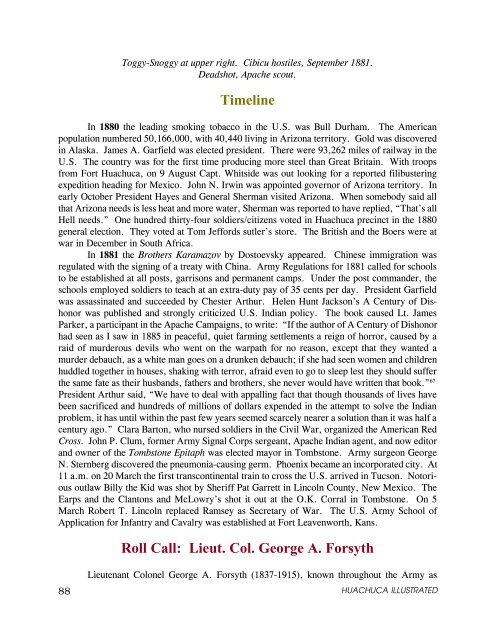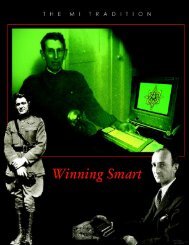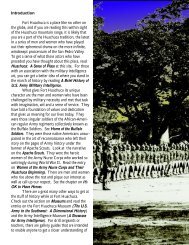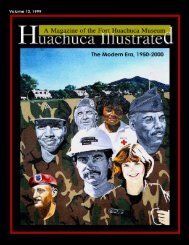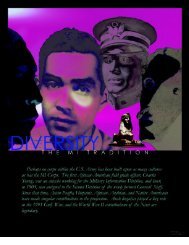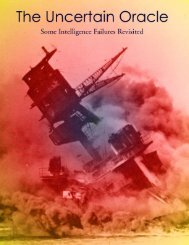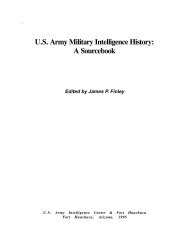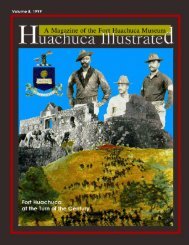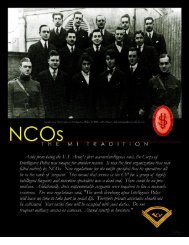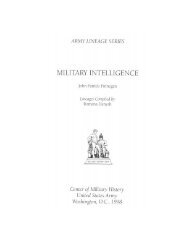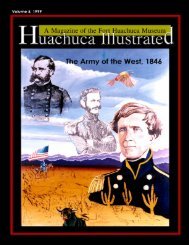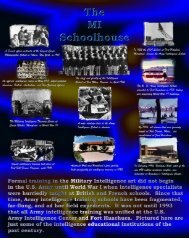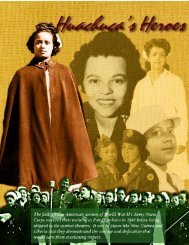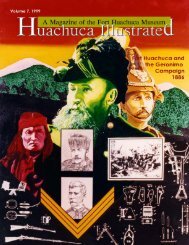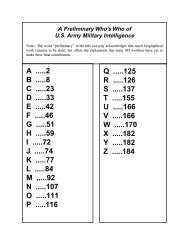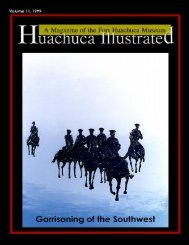Apache Campaigns - Fort Huachuca - U.S. Army
Apache Campaigns - Fort Huachuca - U.S. Army
Apache Campaigns - Fort Huachuca - U.S. Army
Create successful ePaper yourself
Turn your PDF publications into a flip-book with our unique Google optimized e-Paper software.
88<br />
Toggy-Snoggy at upper right. Cibicu hostiles, September 1881.<br />
Deadshot, <strong>Apache</strong> scout.<br />
Timeline<br />
In 1880 the leading smoking tobacco in the U.S. was Bull Durham. The American<br />
population numbered 50,166,000, with 40,440 living in Arizona territory. Gold was discovered<br />
in Alaska. James A. Garfield was elected president. There were 93,262 miles of railway in the<br />
U.S. The country was for the first time producing more steel than Great Britain. With troops<br />
from <strong>Fort</strong> <strong>Huachuca</strong>, on 9 August Capt. Whitside was out looking for a reported filibustering<br />
expedition heading for Mexico. John N. Irwin was appointed governor of Arizona territory. In<br />
early October President Hayes and General Sherman visited Arizona. When somebody said all<br />
that Arizona needs is less heat and more water, Sherman was reported to have replied, “That’s all<br />
Hell needs.” One hundred thirty-four soldiers/citizens voted in <strong>Huachuca</strong> precinct in the 1880<br />
general election. They voted at Tom Jeffords sutler’s store. The British and the Boers were at<br />
war in December in South Africa.<br />
In 1881 the Brothers Karamazov by Dostoevsky appeared. Chinese immigration was<br />
regulated with the signing of a treaty with China. <strong>Army</strong> Regulations for 1881 called for schools<br />
to be established at all posts, garrisons and permanent camps. Under the post commander, the<br />
schools employed soldiers to teach at an extra-duty pay of 35 cents per day. President Garfield<br />
was assassinated and succeeded by Chester Arthur. Helen Hunt Jackson’s A Century of Dishonor<br />
was published and strongly criticized U.S. Indian policy. The book caused Lt. James<br />
Parker, a participant in the <strong>Apache</strong> <strong>Campaigns</strong>, to write: “If the author of A Century of Dishonor<br />
had seen as I saw in 1885 in peaceful, quiet farming settlements a reign of horror, caused by a<br />
raid of murderous devils who went on the warpath for no reason, except that they wanted a<br />
murder debauch, as a white man goes on a drunken debauch; if she had seen women and children<br />
huddled together in houses, shaking with terror, afraid even to go to sleep lest they should suffer<br />
the same fate as their husbands, fathers and brothers, she never would have written that book.” 67<br />
President Arthur said, “We have to deal with appalling fact that though thousands of lives have<br />
been sacrificed and hundreds of millions of dollars expended in the attempt to solve the Indian<br />
problem, it has until within the past few years seemed scarcely nearer a solution than it was half a<br />
century ago.” Clara Barton, who nursed soldiers in the Civil War, organized the American Red<br />
Cross. John P. Clum, former <strong>Army</strong> Signal Corps sergeant, <strong>Apache</strong> Indian agent, and now editor<br />
and owner of the Tombstone Epitaph was elected mayor in Tombstone. <strong>Army</strong> surgeon George<br />
N. Sternberg discovered the pneumonia-causing germ. Phoenix became an incorporated city. At<br />
11 a.m. on 20 March the first transcontinental train to cross the U.S. arrived in Tucson. Notorious<br />
outlaw Billy the Kid was shot by Sheriff Pat Garrett in Lincoln County, New Mexico. The<br />
Earps and the Clantons and McLowry’s shot it out at the O.K. Corral in Tombstone. On 5<br />
March Robert T. Lincoln replaced Ramsey as Secretary of War. The U.S. <strong>Army</strong> School of<br />
Application for Infantry and Cavalry was established at <strong>Fort</strong> Leavenworth, Kans.<br />
Roll Call: Lieut. Col. George A. Forsyth<br />
Lieutenant Colonel George A. Forsyth (1837-1915), known throughout the <strong>Army</strong> as<br />
HUACHUCA ILLUSTRATED


